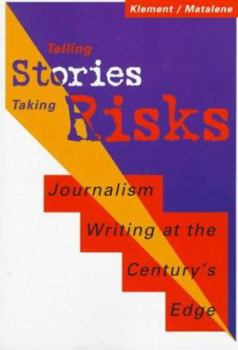Telling Stories/Taking Risks: Journalism Writing at the Century S Edge
Select Format
Select Condition 
Book Overview
Edited by a professor of journalism and a professor of English literature, this newswriting anthology focuses on the teaching of quality journalistic writing and the ways in which current writers... This description may be from another edition of this product.
Format:Paperback
Language:English
ISBN:0534522726
ISBN13:9780534522728
Release Date:August 1997
Publisher:Wadsworth Publishing Company
Length:320 Pages
Weight:1.00 lbs.
Dimensions:0.5" x 6.4" x 9.2"
Related Subjects
Business & Finance Communication Communication & Journalism Communication & Media Studies Communications Humanities Journalism Journalism & Nonfiction Language Arts Media Studies Performing Arts Politics & Social Sciences Skills Social Science Social Sciences Textbooks Words, Language & Grammar WritingCustomer Reviews
2 ratings
A Refreshing Look At Journalism Today - There's Still Hope!
Published by Thriftbooks.com User , 22 years ago
It seems rather presumptuous to begin an introduction with a self-indulging complement. Luckily, Alice Klement and Carolyn Matalene's Telling Stories/Taking Risks rises to the challenge. Klement and Matalene both saw a common strategy amid their peers, a universal theme appearing amongst today's journalistic creations: a need to "get involved, [and] get others involved;" a need to take risks. They assembled a rousing compilation of short stories, taking examples from magazines, newspapers and alternative `zines, that illustrate to aspiring writers and readers how exceptional reporting can be when a journalist goes with their gut feeling, disregards conventional journalistic law and explores the world `outside the box'. Angered by the way today's society has cast non-fiction to the bottom of the ranks, Klement and Matalene successfully show that real stories can be great stories too. When a human face is attached to the facts and to our immediate concerns in life, the story leaves much more of an impact. Telling Stories/Taking Risks is a cascading tower that begins with the writers who remain unseen as they give the accounts of others, then finishes with the journalists who have decided to impart their own life experiences. Journalists in the first section are taking new risks in their writing by telling the stories of those who are rarely noticed, and writing in irregular forms. Julie Sullivan manages to fit the essence of someone's life into 4 inches of copy in Desperate Days at the Merlin, while Greg Raver-Lampman, in his story of a lottery winner, presents the importance of occasionally withholding the end of the story till the end, contrary to the reporting practice of putting the most powerful component of the story in the lead. Telling Stories/Taking Risks asks the question of why we should leave the story telling up to the fictional writers, when journalists can get the real story. In the second chapter, the writers become more than conveyers of information; they observe and partake in their stories, allowing us to learn along with them about everything from small town reporting and snake handlers to following ancestral lines. It is in the third section that the greatest risks are taken; the writers bestow upon us their opinions. Klement and Matalene's choice of stories here is at times questionable, but successful none the less. Keith B. Richburg's Continental Divide seems to long-winded, drawing the readers attention away from the main focus of the book, and Dave Barry's The Name Game, and Read All About It, Dude, although humorous, lack the edginess and solidity of all the other pieces. However, this brief slip-up is compensated greatly by Eugene Izzi's piece on child molestation, Innocence Lost, and Laura Miller's Parkland's Pink Pinafore Problem. Klement and Matalene cause us to become strikingly aware of the importance of the educated journalist to impress their positions and opinions on us, in situat
Great collection of journalism-rule-breaking stories
Published by Thriftbooks.com User , 24 years ago
If you're frustrated by the rules in journalism that seem to favor simplistic non-literary structures accessible to ninth grade readers, you'll marvel at this collection of published stories that break all of the rules. The editors chose works from a wide range of media - GQ to Sports Illustrated to mainstream and alternative newspapers - where writers put the writing first. There's a story that's all one sentence; one that shifts from first to second person throughout; one that uses a false third-person narrative to tell a first-person account. These stories are intense, and the work on the writing/editing is evident. It'll restore your faith in print journalism as a means of communication. The title is misleading - these stories are timeless.






